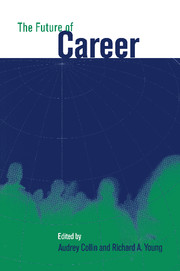Book contents
- Frontmatter
- Contents
- Notes on contributors
- Acknowledgements
- 1 Introduction: framing the future of career
- Part 1 Changing contexts
- Part 2 New perspectives
- Part 3 New directions for theory, practice and policy
- 12 Reconceptualising career theory and research: an action-theoretical perspective
- 13 A new perspective for counsellors: from career ideologies to empowerment through work and relationship practices
- 14 Adapting to the changing multicultural context of career
- 15 Managing careers in organisations
- 16 Learning for work: global causes, national standards, human relevance
- 17 The new career and public policy
- 18 The future of career
- Author index
- Subject index
14 - Adapting to the changing multicultural context of career
Published online by Cambridge University Press: 06 January 2010
- Frontmatter
- Contents
- Notes on contributors
- Acknowledgements
- 1 Introduction: framing the future of career
- Part 1 Changing contexts
- Part 2 New perspectives
- Part 3 New directions for theory, practice and policy
- 12 Reconceptualising career theory and research: an action-theoretical perspective
- 13 A new perspective for counsellors: from career ideologies to empowerment through work and relationship practices
- 14 Adapting to the changing multicultural context of career
- 15 Managing careers in organisations
- 16 Learning for work: global causes, national standards, human relevance
- 17 The new career and public policy
- 18 The future of career
- Author index
- Subject index
Summary
An increasingly global economy and the steady stream of immigrants and refugees from developing to developed nations have prompted many changes in our conceptions of career. One significant change arises from a major demographic trend towards increasing cultural diversity of populations in many parts of the world. This trend will have significant impact on both the practice of and theoretical developments in career psychology. The future of career, how it is conceptualised, experienced, and addressed in counselling, will be shaped by this significant demographic trend. A monocultural, or ethnocentric approach to careers will no longer be viable as the modus operandi for either career theorists or career counselling practitioners. In this chapter, we discuss the changing multicultural context of career. Although a multicultural mindset is developing, career theory, research, and counselling interventions still have a long way to go to attend to the increasing cultural diversity within the population. Our thesis posits that cultural issues will feature largely in the future of career.
Multiculturalism: from demographics to mindsets
Through the confluence of several different factors, many psychologists have come to realise that theories and models based on a Eurocentric paradigm fail to apply to a significant portion of their students, clients, and research participants. These factors range from the increasing cultural diversity in the demographics of many Western nations (Triandis, Dunnette, & Hough, 1994) to the development of a ‘global community’ made possible by the explosive growth of the Internet and the World Wide Web, to the development of satellites and international (versus primarily national) news bureaus such as Cable Network News.
- Type
- Chapter
- Information
- The Future of Career , pp. 212 - 227Publisher: Cambridge University PressPrint publication year: 2000
- 17
- Cited by

